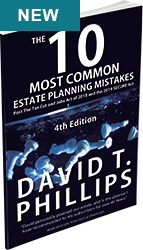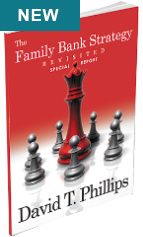
Bob Carlson - Retirement Watch
Bob Carlson's - Here’s the Truth About ‘Secret’ Retirement Plans and Personal Bank Accounts

Here’s the Truth About ‘Secret’ Retirement Plans and Personal Bank Accounts
You’ve seen the hype. Now, let’s look at the facts.
There’s a widely promoted estate and financial planning strategy I’m often asked about. It’s been called the Secret 770 Account and the President’s Account. Other names are Banking on Yourself®, Infinite Banking®, LIRP, and Becoming Your Own Banker®. I’ve also seen it described as The Personal Bank, The Power of Zero, and The Retirement Miracle. Ed Slott, CPA and IRA expert, refers to it as “the single most important benefit in the tax code.”
Many of the promotions say the strategy is confidential, new, revolutionary and, of course, Wall Street’s hidden secret. Also, banks and Wall Street don’t want you to know about it, and only a privileged few of the well-connected have been able to use it, such as presidents, major corporations and the very wealthy.
Bob Carlson's - Two Strategies That Beat the SECURE Act

Two Strategies That Beat the SECURE Act
There’s a tax bill attached to each traditional individual retirement arrangement (IRA) and 401(k), and Congress recently tried to accelerate and increase that tax bill.
That’s why, following enactment of the Setting Every Community Up for Retirement Enhancement (SECURE) Act, many IRA and 401(k) owners need to revamp their estate planning strategies.
As I’ve reported, the SECURE Act ends the Stretch IRA. When an IRA or other retirement plan is inherited, most of the time the beneficiaries must distribute the entire account within 10 years. There are exceptions for a surviving spouse, minor children, a disabled beneficiary and a few others. But in most cases, the ability to make the tax deferral of an inherited account last more than 10 years is eliminated.
Read more: Bob Carlson's - Two Strategies That Beat the SECURE Act
Bob Carlson's - Protect Your Legacy by Taking the Steps Most People Don’t

Protect Your Legacy by Taking the Steps Most People Don’t
Most Americans know the legacy they want to leave, but few take even the minimal steps to ensure that legacy. A legacy is what you leave behind, especially to heirs and loved ones. A legacy can include things, such as money, property and other tangible items. Some of these items might have monetary value while others have mostly emotional value.
A legacy also can include the intangible, such as values, life lessons and final wishes and instructions. Americans ages 55 and older generally agree on the legacies they want to leave.
Read more: Bob Carlson's - Protect Your Legacy by Taking the Steps Most People Don’t
Bob Carlson's - My 2021 Strategy for the Long-Term Care (LTC) Crisis
|
|
|
Read more: Bob Carlson's - My 2021 Strategy for the Long-Term Care (LTC) Crisis
Bob Carlson's - Congress Plans to Kill the Stretch IRA, But You Can Do An End-Around

Congress Plans to Kill the Stretch IRA, But You Can Do An End-Around
We’re nearing a critical time for many Individual Retirement Account (IRA) owners. Advance IRA planning will be imperative if you want to maximize the after-tax value of your IRA for heirs and avoid the new tax burden Congress has in mind.
As I explained last month, despite the deadlock and division in Washington, the Setting Every Community Up for Retirement Enhancement (SECURE) act moved through the House of Representatives by a vote of 417 to 3 in May. A version of it is likely to pass the Senate and become law later this year. The SECURE Act and its Senate counterpart have a number of provisions designed to expand retirement savings opportunities and would delay required minimum distributions (RMDs).
To make up for the lost tax revenue, the SECURE Act and the Senate version would end the Stretch IRA. The Stretch IRA is a strategy in which children who inherit an IRA make maximum use of the tax code to minimize distributions for years. In many cases, the RMDs are less than the investment return of the IRA, so the IRA not only lasts for decades but increases in value. Under the SECURE Act, beneficiaries (other than minor children and a few other exceptions) would have to distribute and pay taxes on an inherited IRA within 10 years, even Roth IRAs.
Read more: Bob Carlson's - Congress Plans to Kill the Stretch IRA, But You Can Do An End-Around
Bob Carlson's - An Answer To Today’s Long-Term Care Crisis

An Answer To Today’s Long-Term Care Crisis
My favorite long-term care protection plan is improved and attractive to more people than before. You have more options than ever to help pay for future long-term care, and these newer options are significantly more appealing and rewarding than traditional long-term care insurance.
I’ve covered in the past the many troubles in traditional long-term care insurance (LTCI). Most insurers exited the market. Many of the remaining insurers continue to raise premiums on existing policyholders.
Read more: Bob Carlson's - An Answer To Today’s Long-Term Care Crisis
Bob Carlson's - The War on Stretch IRAs is Back

The War on Stretch IRAs is Back
There long has been a group in Congress determined to end the Stretch IRA, and this year they seem intent to have their way. I’ve reported in the past few years that many in Washington were targeting the Stretch IRA. The Obama administration called for an end to this valuable estate planning tool in its annual budgets. A bipartisan group in Congress agreed, and it appears that group is growing.
Their latest vehicles are two retirement bills working their way through Congress. The version in the House of Representatives is called “Setting Every Community Up for Retirement Enhancement” (the SECURE Act). The Senate version is titled “Retirement Enhancement and Savings Act” (RESA). The bills have a number of provisions, many beneficial to retirees and pre-retirees.
One goal is to give more workers, especially small business employees, access to employer retirement plans. Small businesses would receive a credit of up to $500 annually to defray the start-up costs of some retirement plans. Also, long-time part-time workers would be allowed to contribute to their employers’ plans.
Bob Carlson's - Multiplying the Money Available for Long-Term Care

Multiplying the Money Available for Long-Term Care
Traditional long-term care insurance might be dying, but there are other, and probably better, ways to protect your family and assets from the potentially onerous costs of long-term care.
In 2017, only 66,000 traditional longterm care (LTC policies) were sold. That’s 10% of the number sold 20 years earlier. Steep premium increases on existing policies are the main reason traditional LTC insurance is in decline. In August, regulators in 22 states approved another 58% increase in premiums on some existing Genworth policies. That follows 28% increases in each of the last two years. Other insurers have had significant increases approved in recent years.
Read more: Bob Carlson's - Multiplying the Money Available for Long-Term Care
Bob Carlson's - When to Replace Bonds with Annuities

When to Replace Bonds with Annuities
Evidence continues to accumulate in favor of including the right kinds of annuities in your portfolio. Annuities have a bad rap in much of the financial media. Some of that’s deserved, because there are annuities that are complicated, charge high fees and have a lot of restrictions. There also are annuities that are sold to the wrong people. The right annuity, however, will increase your financial security and portfolio returns.
Read more: Bob Carlson's - When to Replace Bonds with Annuities
Bob Carlson's - July 2017

Solving the Long-Term Care Conundrum
Long-term care expenses are one of the great retirement fears. For many people, the cost and uncertainty of long-term care are only one reason for the anxiety. Even more anxiety is triggered by trying to sort through the options to fund potential long-term care expenses. Comparing the choices baffles even many financially savvy people and advisers.
In the past, I've presented different strategies and tools to finance longterm care (LTC). This month, I show you how to analyze several choices and pick the one, or the combination, that is best for you.
Bob Carlson's - May 2017 (2)

Leveraging Cash to Pay for Long-Term Care
New ways to plan for potential long-term care expenses continue to be developed. There are many more ways available to secure their own and their families' financial independence than most people realize.
We discussed in previous issues the problems traditional long-term care policies have had in the past. See our November 2012 issue, for example. Those problems are why many people seeking protection from long-term care (LTC) expenses turned to annuities and life insurance policies with long-term care riders. These approaches often allow you to leverage your cash, providing more in LTC benefits than the money you put into the policy. Yet, unlike traditional LTC policies, you have access to your money and benefits are paid to your heirs in many cases. The policies often are ideal when you have cash invested conservatively for emergency needs such as LTC.
Bob Carlson's - May 2017

Why You Still Might Need Life Insurance
Your estate isn't likely to be subject to the federal estate tax, so you don't need life insurance. Right? Maybe not.
Permanent life insurance was a mainstay of estate planning when even most middle class families faced the federal estate tax. It ensured taxes were paid and loved ones had a legacy.
Bob Carlson's - October 2015

A Higher Return on Safe Money, Plus LTC Benefits
Most of you have a slug of "safe money" on which you'd like to earn a higher return without risking your principal. You also would like to protect your estates from long-term care expenses without the use-it-or-lose-it feature of standalone long-term care insurance policies. There are tools available to help you reach these goals.
In the past we've discussed indexed annuities. (See our April 2014 visit.) Several times in past visits we've also discussed the combo policies, such as annuities with long-term care benefits. Longtime readers know that I don't favor most policies that combine life insurance or annuities with LTC. They have shortcomings such as low returns, high costs for the LTC features, and less-than robust LTC benefits. Once in a while an exception comes along that's worth considering.
Let's start with a review of the basics of indexed annuities.
Bob Carlson's - January 2015

Hype About "Secret Accounts" - Exposed
Let's begin the year by revealing the facts behind some rather questionable marketing pitches. Have you heard of the Secret 770 Account? The President's Account? What about Banking on Yourself® or Infinite Banking? Becoming Your Own Banker, The Personal Bank, or The Retirement Miracle?
If you read financial publications, especially online, you almost certainly have heard of some of these. You've been told these financial tools are confidential, new, revolutionary, and of course, Wall Street's hidden secret. You're told that only a privileged few of the well-connected have used them, including presidents, major corporations, and the very wealthy. You might be told banks and Wall Street don't want you to know about them.




